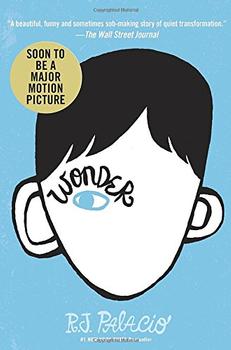Summary | Excerpt | Reviews | Beyond the Book | Read-Alikes | Genres & Themes | Author Bio

This article relates to Wonder
Whatever you're thinking, it's probably worse.
This is Auggie's statement on page one of Wonder about the appearance of his face. R.J. Palacio (whose real name is Raquel Jaramillo... Palacio is her mother's last name) makes a very conscious choice not to explore Auggie's disfigurement head-on, and I think it's a good one. Instead, she allows the reader to create her own images and then, very slowly and from a slanted sort of angle, Palacio gives details. Because at the heart of issue is, well, Auggie's heart, and that is all that matters.
I don't want to dishonor Palacio's choice, but I will give you a bit of information about Auggie's condition. He has something called Mandibulofacial Dysostosis, which is more typically known as Treacher Collins Syndrome (after famous British ophthalmologist Edward Treacher Collins who recorded the description of this syndrome in a paper in 1900.) It is a hereditary condition caused by a defective protein called treacle. It affects approximately one in 50,000 births. Its symptoms and characteristics vary from person to person, and can be so minor is it hardly discernable, or very severe - like with Auggie. It always affects facial features and functions, such as abnormally formed ears and thus hearing loss. Intelligence is not usually affected, and children with Treacher Collins Syndrome commonly grow to be fully and normally functioning adults.
Why did Palacio choose to write a novel about a boy with this syndrome? As she says on her website:
About five years ago I took my kids to visit a friend of mine who lives out of town, and at some point during the day we found ourselves sitting next to a little girl who looked the way Auggie looks in the book. We were in front of an ice cream shop, and she was sitting next to us with her mother and a friend. My younger son was only about three at the time, and he reacted exactly the way you might think a three-year old would react when seeing something that scared him: he started to cry - pretty loudly, too. And though my older son, who was ten at the time, knew better than to stare, his expression said it all despite his best efforts: he looked like someone had just punched him. It was terrible, on all counts, and I got up as quickly as I could to remove us from the scene - not for their sakes, of course, but to spare the little's girl's feelings. As I pushed my younger son's stroller away I heard the little girls' mom say, in as sweet and calm a voice as you can imagine: "Okay, guys, I think it's time to go." And that just got to me.
That scene played out in Palacio's head - over and over again - as she drove home that day. She couldn't stop thinking about that little girl and the countless stares and sideways glances and rude comments that she must have to endure day after day. Palacio wondered what she could teach her two children that would help them understand how to respond better to an encounter like the one they had just experienced. And then Natalie Merchant's song Wonder came on the car radio (lyrics here), and Palacio had her book. She said, "The book kind of wrote itself in my head on that drive home. I would write the story from the child's point of view. It would help people understand - not pity. I'm just like you, the child would say. I'm an ordinary kid - except for this one thing. And I would call the book Wonder because this child is a wonder."
R.J. Palacio was a book jacket designer and art director for many years before taking the plunge into writing this first novel. And it was a plunge! A middle of the night plunge. For one year, Palacio would come home from work, make dinner, help her kids with homework, go to bed, and then get up at midnight to write for two hours before going back to bed again. Talk about a wonder!
![]() This article relates to Wonder.
It first ran in the June 14, 2012
issue of BookBrowse Recommends.
This article relates to Wonder.
It first ran in the June 14, 2012
issue of BookBrowse Recommends.
Your guide toexceptional books
BookBrowse seeks out and recommends the best in contemporary fiction and nonfiction—books that not only engage and entertain but also deepen our understanding of ourselves and the world around us.